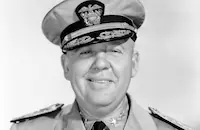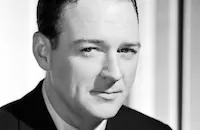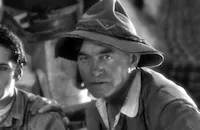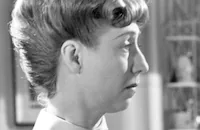They Knew What They Wanted
Cast & Crew
Garson Kanin
Carole Lombard
Charles Laughton
William Gargan
Harry Carey
Frank Fay
Film Details
Technical Specs

Synopsis
While visiting San Francisco, Tony Patucci, a simple grape grower from the Napa Valley, sees waitress Amy Peters and falls in love. Returning home without ever meeting Amy, Tony persuades his foreman Joe, an incorrigible womanizer and wanderer, to write a letter to Amy in Tony's name. Tony's courtship by mail culminates with his proposal to Amy, and when she requests a picture of him, Tony sends her one of Joe. Amy, destitute and willing to do anything to escape poverty, accepts the proposal and journeys to Napa to be married. Horrified to discover that her prospective husband is not the handsome young man in her photo, but rather the portly, earthy Tony, Amy reluctantly decides to go through with the alliance. However, during a celebration on the eve of the wedding, Tony falls from a rooftop and breaks both his legs, and as he lies in bed recuperating, Amy and Joe succumb to their carnal desires. Two months later, Tony is able to walk again, and as he joyously plans the wedding, Amy discovers that she is pregnant. Upon learning of his betrayal, Tony pummels Joe, who leaves the vineyards in shame. As he leaves, Joe passes Father McKee, the village priest who has come to drive Amy and Tony to their wedding, and tells the priest the awful truth. The big-hearted Tony forgives Amy and insists that they still be married, but Amy is unable to forgive herself and, repentant, drives off with Father McKee as Tony looks on, hoping that she will return one day.

Director

Garson Kanin
Cast

Carole Lombard

Charles Laughton

William Gargan

Harry Carey
Frank Fay
Joe Bernard
Janet Fox
Lee Tung-foo

Karl Malden
Victor Kilian
Paul Lepere

Marie Blake
Millicent Green
Patricia Oakley
Crew
Robert Ardrey
John L. Cass
Harry E. Edington
Mark-lee Kirk
Alfred Newman
Van Nest Polglase
Erich Pommer
Ruby Rosenberg
Darrell Silvera
Edward Stevenson
Harry Stradling
John Sturges
Vernon L. Walker

Film Details
Technical Specs

Award Nominations
Best Supporting Actor
Quotes
Trivia
Notes
The working title of this film was The Other Man. Materials contained in the MPAA/PCA Collection at the AMPAS Library note that PCA Director Joseph I. Breen originally forbade the studio to use the title of the play for their production, and hence RKO changed the title to The Other Man. The film's writers, along with director Garson Kanin and actress Carole Lombard successfully lobbied Breen to allow the film to maintain the title They Knew What They Wanted. Breen insisted however, that the sinners be punished at the end of the film. According to an article in Look, after Italy entered the war, the studio wanted Kanin to change the nationality of the character played by Charles Laughton. Kanin refused, however, and received permission from the British Embassy to allow Laughton to play an Italian-American. News items in Hollywood Reporter add that the film was shot on location in the Napa Valley, CA. William Gargan was nominated for an Academy Award in the Actor, Supporting Role category.
Modern sources note that RKO paid Sidney Howard $50,000 for the rights to his Pulitzer Prize winning play. Other filmed versions of the play are Paramount's 1928 production The Secret Hour, which was directed by Rowland V. Lee and starred Pola Negri and M-G-M's 1930 picture A Lady to Love, which was directed by Victor Seastrom and starred Vilma Banky and Edward G. Robinson. The 1956 musical play The Most Happy Fella produced by Kermit Blomgarden and Lynn Loesser was also based on Howard's play.












